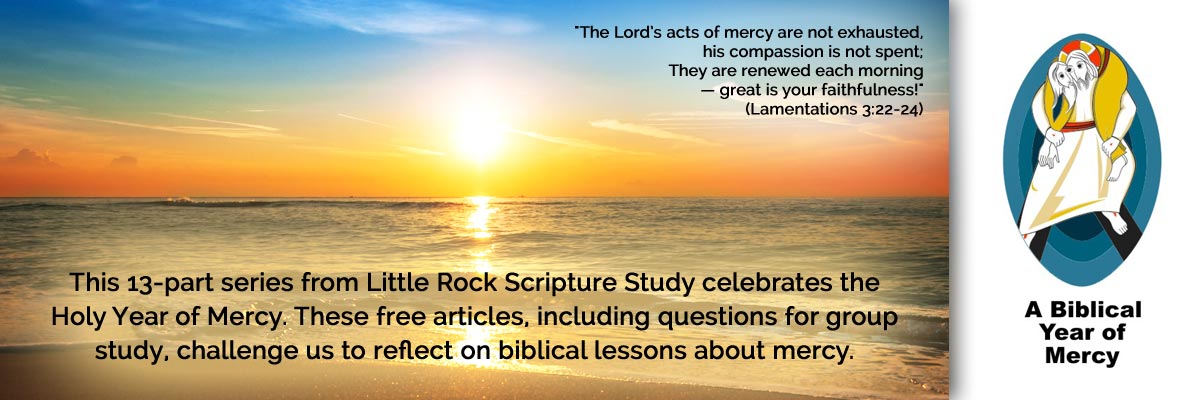Official Website of the
Catholic Diocese of Little Rock
God is generous, rich in mercy and love
Published: July 16, 2016
This is the eighth column in a 13-part series.
By Cackie Upchurch
Director of Little Rock Scripture Study
Recently, a young Franciscan was recounting his experience of encountering a new person in the prison facility where he ministers. The inmate was quite intimidating with his thick physique, massive tattoos and dominating presence. The young priest was a regular visitor who ministered in the prison but he admitted to being anxious when this new inmate requested some time with him.
 It turned out to be a grace-filled experience. One of the things that became apparent to the priest was that he was focusing on the man’s past — the events that led him to prison, represented in his very daunting presence — while the inmate was focused on the present moment and what lay ahead. His desire was to move from a painful past into a new future.
It turned out to be a grace-filled experience. One of the things that became apparent to the priest was that he was focusing on the man’s past — the events that led him to prison, represented in his very daunting presence — while the inmate was focused on the present moment and what lay ahead. His desire was to move from a painful past into a new future.
Perhaps it is that same dynamic that Paul so often brought to the surface in his New Testament writings. A very good example can be found in Ephesians 2:1-10.
It begins by outlining what is in the past: “You were dead in your transgressions and sins in which you once lived … disobedient … following the wishes of the flesh” (verses 1, 2, 3). It ends by proclaiming what God has done and will do, “brought us to life with Christ … to show the immeasurable riches of his grace” (verses 5, 7).
In the middle of this section, verse 4, is the “hinge,” that piece that allows the past to be closed and the future to be opened. It is this succinct experience and description of divine intervention: “God, who is rich in mercy.”
The early Church witnessed to a very clear sense of God’s initiative in freeing believers from the burdens of their own sinfulness. Were there consequences to immorality and selfishness and ignorance of God’s way of living? Of course.
Those consequences were seen in the descending spiral of self-hatred or guilt and shame or further immorality, what Paul describes as death. Freedom from that spiritual death is not something that can be accomplished by one’s own power or good intention or good deeds, but by God’s initiative, God’s mercy and love.
In the passage cited from Ephesians, this God who is “rich in mercy” and because of “the great love he had for us” brought us to life. This life is described in verses 5 and 6: life with Christ, raised up with him, and seated with him in the heavens. Notice the repeated use of the word “with.”
What God has done for Christ by raising him from the dead and seating him next to the Father, God is doing for us, even when it seems we may not deserve such lavish mercy and love. We are experiencing these things with Christ, in the present and more fully in the future.
Ephesians 2:8 sums it up beautifully: “For by grace you have been saved through faith, and this is not from you; it is the gift of God.” Mercy, grace, love — all of these are expressions of God’s nature, reminders that even through our best efforts to change, salvation cannot be earned.
In spite of our sinfulness, salvation is freely given not because of what we have done or who we are, but because of who God is. Simply put, even our best efforts to reform ourselves cannot outdo the grand scale of God’s grace and the lavishness of God’s generosity on our behalf.
In his book, “The Name of God is Mercy,” Pope Francis writes, “Pius XII, more than a half century ago, said that the tragedy of our age was that it had lost its sense of sin, the awareness of sin. Today, we add further to the tragedy by considering our illness, our sins, to be incurable, things that cannot be healed or forgiven. We lack the actual concrete experience of mercy.
"The fragility of our era is this, too: we don’t believe there is a chance for redemption; for a hand to raise you up, flood you with infinite, patient, indulgent love: to put you back on your feet. We need mercy.”
The beauty of it is that God’s mercy is already available to us and it does not simply heal the past. God’s mercy invades our present circumstances so that we can look hopefully to the future.
Study Questions
Have you ever been hesitant to extend mercy to someone else because of their past or some negative experience with them?
When has an experience from the past held back someone you know, or even yourself, from experiencing God’s mercy?
Read Ephesians 2:1-10. What parts of this reading do you find yourself resisting? What parts draw you in?
What practices in your personal life help you to open yourself to experience God’s generosity? How do these practices help you to also become more generous to others?
This article was originally published in Arkansas Catholic July 16, 2016. Copyright Diocese of Little Rock. All rights reserved. This article may be copied or redistributed with acknowledgement and permission of the publisher.




